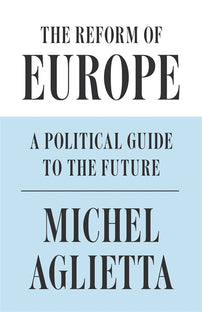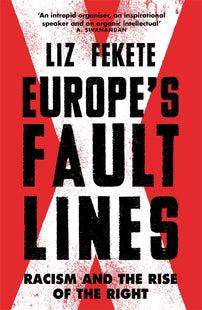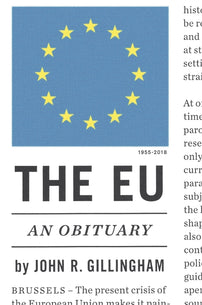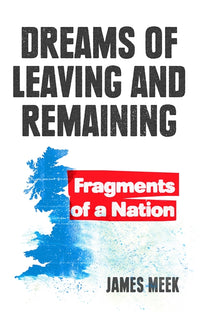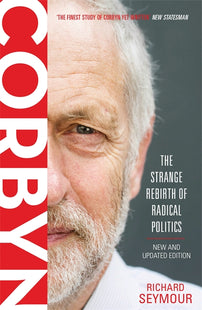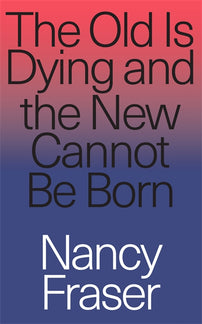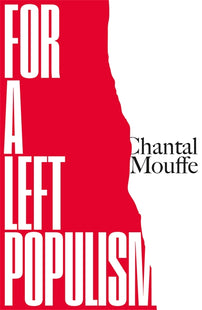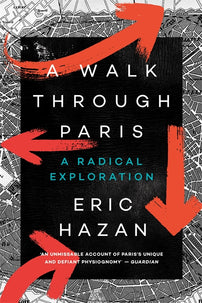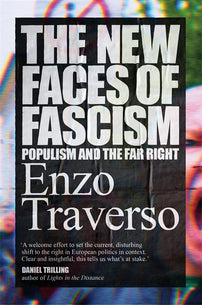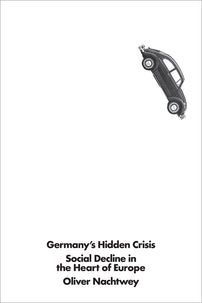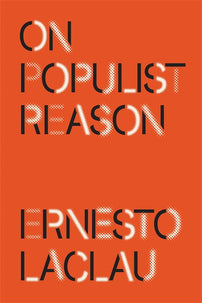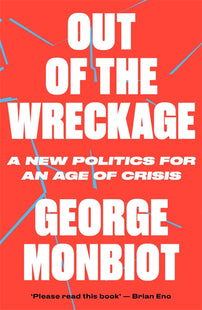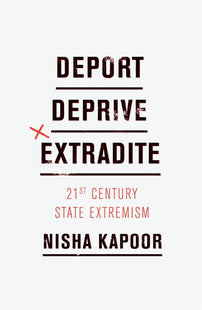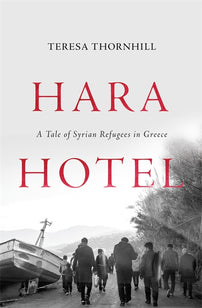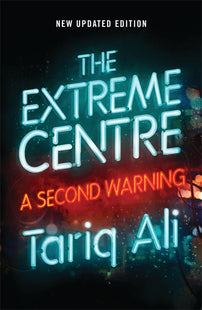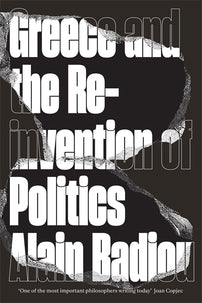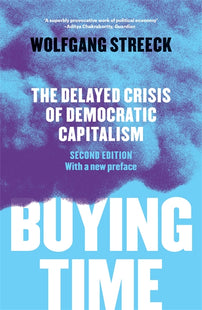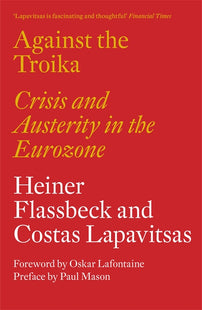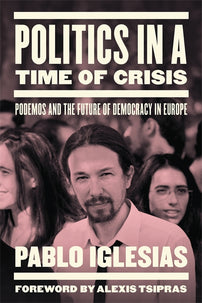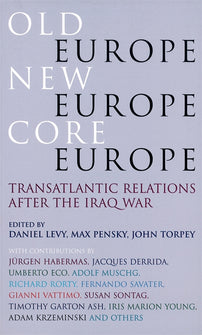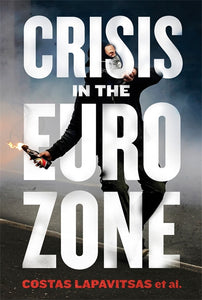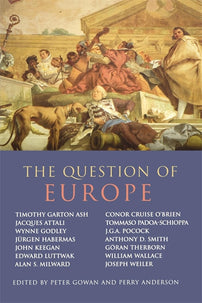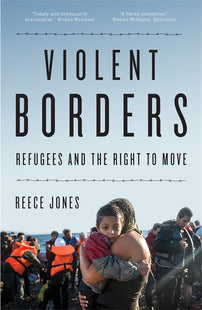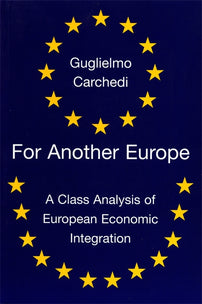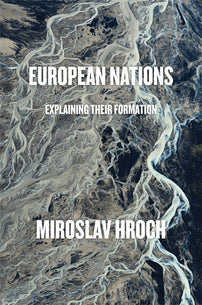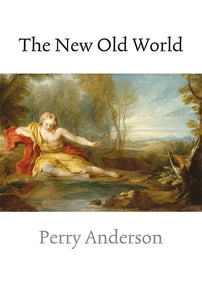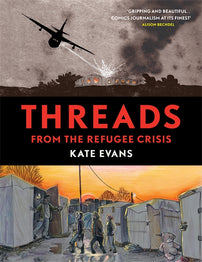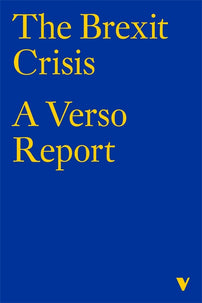Verso's Europe Bookshelf
The morning after the European Parliament elections come to a close in the UK, we share our key Europe reading

‘Let’s Take Back Control’ was the slogan that won the UK’s EU Referendum. But what did those words mean to campaigners and voters? Control of what was being wrested from whom and why? And in whose interest was this done? From books that expose the fundamental fault lines of racism in contemporary Europe, to the most pressing issues of our time: the refugee crisis, Britain’s exit, the foundering eurozone, and the increasing disquiet among its member states, here we share our essential reading on Europe.
See also our *FREE EBOOK*, The Brexit Crisis, which gathers together some of the most insightful and provocative reactions to this moment, from the UK and abroad, examining what happened on the 23 June and what this might mean for the UK and the EU as a whole. It looks at the ruptures, false promises and ingrained racism revealed during the campaign and afterwards. As the UK heads towards the exit, what is to be done?
[book-strip index="1" style="buy"]The Reform of Europe demonstrates the need for a long-term vision with two goals: the reconstruction of a social contract based on entrepreneurial partnership and investment in the transition to ecological sustainability. This political vision will restore to citizens of the member states a sense of belonging to a wider community. To this end, argues Michel Aglietta, one of today’s most important heterodox economists, we must strengthen European institutions at the financial and fiscal levels. This means making the euro a full currency, endowed with democratic legitimacy.
[book-strip index="2" style="buy"]Old racisms may be structured deep in European thought, but they have been revitalised and spun in new ways: the war on terror, the cultural revolution from the right, and the migration-linked demonisation of the destitute “scrounger.” Drawing on more than three decades of work for the Institute of Race Relations, Liz Fekete exposes the fundamental fault lines of racism an tarianism in contemporary Europe.
[book-strip index="3" style="buy"]Fully updated and revised, this new edition of John R. Gillingham’s swingeing study explains why the European Union is so profoundly unsuited to the modern political economy. In a devastating historical account of political failure, he takes readers back to the union’s postwar origins, when it was considered the best means to guarantee peace, demonstrating how the flaws of the institution date to its origins. Today, these inherent failings leave it unable to deal with the most pressing issues of our time: the refugee crisis, Britain’s exit, the foundering eurozone, and the increasing disquiet among its member states. In a globalised marketplace where technological innovation transcends state boundaries, the EU is no longer fit for purpose. It is time to let the union dissolve.
[book-strip index="4" style="buy"]Dreams of Leaving and Remaining is urgent reporting from one of Britain’s finest journalists. James Meek asks what we can recover from the debris of an old nation as we head towards new horizons, and what we must leave behind. There are no easy answers, and what he creates instead is a masterly portrait of an anxious, troubled nation.
[book-strip index="5" style="buy"]The founding story of the EU is that it exists to ensure the horrors of the twentieth century are never repeated. Now, as it comes to terms with the worst refugee crisis since the Second World War, its declared values of freedom, tolerance and respect for human rights are being put to the test. Lights in the Distance is a uniquely powerful and illuminating exploration of the nature and human dimensions of the crisis.
[book-strip index="6" style="buy"]Richard Seymour tells the story of how Corbyn’s rise was made possible by the long decline of Labour and by a deep crisis in British democracy. He shows how Corbyn began the task of rebuilding Labour as a grassroots party, with a coalition of trade unionists, young and precarious workers, students and ‘Old Labour’ pugilists, who then became the biggest campaigning army in British politics. Utilizing social media, activists turned the media’s Project Fear on its head and broke the ideological monopoly of the tabloids. After the election, with all the artillery still ranged against Corbyn, and with all the weaknesses of the Left’s revival, Seymour asks what Corbyn can do with his newfound success.
[book-strip index="7" style="buy"]Neoliberalism is fracturing, but what will emerge in its wake?
Across the globe politics as usual is being rejected and faith in neoliberalism is fracturing beyond repair. Leading political theorist Nancy Fraser, in conversation with Jacobinpublisher Bhaskar Sunkara, dissects neoliberalism’s current crisis and argues that we might wrest new futures from its ruins.
[book-strip index="8" style="buy"]What is the “populist moment” and what does it mean for the left?
We are currently witnessing in Western Europe a “populist moment” that signals the crisis of neoliberal hegemony. The central axis of the political conflict will be between right- and left-wing populism. By establishing a frontier between “the people” and “the oligarchy,” a left–populist strategy could bring together the manifold struggles against subordination, oppression and discrimination.
[book-strip index="9" style="buy"]Eric Hazan, author of the acclaimed Invention of Paris, takes the reader on a walk from Ivry to Saint-Denis, roughly following the meridian that divides Paris into east and west, and passing such familiar landmarks as the Luxembourg Gardens, the Pompidou Centre, the Gare du Nord and Montmartre, as well as forgotten alleyways and arcades. Weaving historical anecdotes, geographical observations, and literary references, Hazan’s walk guides us through an unknown Paris. With the aid of maps, he delineates the most fascinating and forgotten parts of the city’s past and present.
[book-strip index="10" style="buy"]What does fascism mean at the beginning of the twenty-first century? When we say the word, our memory goes back to the years right between the two world wars and envisions a dark landscape of violence, dictatorships, and genocide. These images spontaneously surface in the face of the rise of the radical right, racism, xenophobia, islamophobia and terrorism, the last of which is often depicted as a form of “Islamic fascism’. Beyond some superficial analogies, however, all these contemporary tendencies reveal many differences from historical fascism, probably greater than their affinities. Paradoxically, the fear of terrorism nourishes the populist and racist rights with Marine Le Pen in France or Donald Trump in the US claiming to be the most effective ramparts against “Jihadist fascism’. But since fascism was a product of imperialism, can we define as fascist a terrorist movement whose main target is Western domination?
[book-strip index="11" style="buy"]Upward social mobility represented a core promise of life under the “old” West German welfare state, in which millions of skilled workers upgraded their Volkswagens to Audis, bought their first homes, and sent their children to university. Not so in today’s Federal Republic, where the gears of the so-called “elevator society” have long since ground to a halt. In the absence of the social mobility of yesterday, widespread social exhaustion and anxiety have emerged across mainstream society. Oliver Nachtwey analyses the reasons for this social rupture in postwar German society and investigates the conflict potential emerging as a result. He concludes that although the country has managed to muddle through thus far, simmering tensions beneath the surface nevertheless threaten to undermine the German system’s stability in the years to come.
Recipient of the Friedrich Ebert Foundation 2016 Hans-Matthöfer-Preis for Economic Writing.
[book-strip index="12" style="buy"]It is impossible to think of Russia today without thinking of Vladimir Putin. More than any other major national leader, he personifies his country in the eyes of the world, and dominates Western media coverage. In Russia itself, he is likewise the centre of attention both for his supporters and his detractors. But, as Tony Wood argues, this focus on Russia’s president gets in the way of any real understanding of the country. The West needs to shake off its obsession with Putin and look beyond the Kremlin walls.
[book-strip index="13" style="buy"]Jacques Lacan made this gloomy prophesy back in 1959: but doesn’t it also apply to our own time? Faced with a rise in attacks around the world, can we really just blame the “radicalisation of Islam’? What hope is there for the alienated youth, as the wars that have ravaged the Middle East spill out across the globe? For Alain Bertho, the mounting chaos we see today is, above all, driven by the weakening of states’ legitimacy under the pressure of globalisation. Add to this the hypocrisy of the elites who beat the drum of “security measures,” even as they sow the seeds of violence around the world. This disorder is the swamp of despair which can only produce fresh atrocities. Today’s youth are the lost children of neoliberal globalisation, the inheritors of the political and human chaos it produces. When they find it easier to imagine the end of the world than the end of capitalism, their revolt tends to take the paths of martyrdom and despair. The closing of the revolutionary hypothesis allows only fury. The answer, Bertho argues, is a new radicalism, able to inspire a collective hope in the future.
[book-strip index="14" style="buy"]In this highly original and influential work, Ernesto Laclau focuses on the construction of popular identities and how “the people” emerge as a collective actor. Skilfully combining theoretical analysis with a myriad of empirical references from numerous historical and geographical contexts, he offers a critical reading of the existing literature on populism, demonstrating its dependency on the theorists of “mass psychology,” such as Taine and Freud. On Populist Reason is essential reading for all those interested in the question of political identities in the present day.
[book-strip index="15" style="buy"]Economics for the Many, edited and with an introduction by Shadow Chancellor of the Exchequer John McDonnell, features contributions from the participants in his New Economics conferences, including Barry Gardiner, Ann Pettifor, Prem Sikka, and Guy Standing. It covers topics from housing, public ownership, and fairer international trading systems to industrial policy for the twenty-first century and how to tackle tax avoidance and regional imbalances. Together, the essays in this volume lay out a vision for a new economics, one that works for the many, not the few.
[book-strip index="16" style="buy"] [book-strip index="17" style="buy"]In 2012 five Muslim men—Babar Ahmad, Talha Ahsan, Khalid al-Fawwaz, Adel Abdul Bary, and Abu Hamza—were extradited from Britain to the US to face terrorism-related charges. Fahad Hashmi was deported a few years before. Abid Naseer and Haroon Aswat would follow shortly. They were subject to pre-trial incarceration for up to seventeen years, police brutality, secret trials, secret evidence, long-term detention in solitary confinement, citizenship deprivation and more. Deport, Deprive, Extradite draws on their stories as starting points to explore what they illuminate about the disciplinary features of state power and its securitising conditions.
[book-strip index="18" style="buy"]Teresa Thornhill volunteered at Hara Hotel, a makeshift camp on the Greece–Macedonia border. An Arabic speaker, she met Syrians from all walks of life as she distributed clothing and organized activities for children. One of the Syrians was Juwan, who would later walk through the mountains of Macedonia to safety in Austria.
In Hara Hotel, Thornhill interweaves a narrative of daily life at the camp with Juwan’s extraordinary story, the recent history of the revolution in Syria, and an account of the ensuing civil war, painting a vivid picture of the predicament of Syrians trapped on Europe’s borders.
In this fully updated edition of The Extreme Centre, Ali considers recent events that suggest, despite everything, that there is room for hope. He finds promise in Latin America and at the edges of Europe. Emerging parties in Scotland, Greece, and Spain, formed out of the 2008 crisis, are offering new promise for democracy. Even in the UK, with the rise of Jeremy Corbyn, there are indications that the hegemony of the centre may be weaker than imagined.
[book-strip index="20" style="buy"]Over the last six years, Greece has provided the world with “an open-air political lesson.” The country’s deep economic and social crisis has exposed the fundamental contradictions of the European Union, and indeed the capitalist world as a whole. It has been a test case for movements seeking to put an end to the authoritarian anarchy of neoliberal capitalism. The Greek resistance to EU institutions and financial-market hegemony offered a beacon of hope. Yet the “movementist” politics of 2011 could not build anything lasting, and Syriza’s efforts as a party of government soon led to impasse. For Alain Badiou, it is not enough to mourn this defeat—we must understand why such a vigorous opposition could fail.
[book-strip index="21" style="buy"]In the long-established democracies of Western Europe, electoral turnouts are in decline, membership is shrinking in the major parties, and those who remain loyal partisans are sapped of enthusiasm. Peter Mair’s new book weighs the impact of these changes, which together show that, after a century of democratic aspiration, electorates are deserting the political arena. Mair examines the alarming parallel development that has seen Europe’s political elites remodel themselves as a homogeneous professional class, withdrawing into state institutions that offer relative stability in a world of fickle voters. Meanwhile, non-democratic agencies and practices proliferate and gain credibility—not least among them the European Union itself, an organization contributing to the depoliticization of the member states and one whose notorious ‘democratic deficit’ reflects the deliberate intentions of its founders.
[book-strip index="22" style="buy"]In this new edition of a highly acclaimed book, Wolfgang Streeck revisits his recent arguments in the light of Brexit and the continued crisis of the EU. These developments are only the latest events in the long neoliberal transformation of postwar capitalism that began in the 1970s, a process that turned states away from tax toward debt as a source of revenue, and from that point into the ‘consolidation state’ of today. Central to this analysis is the changing relationship between capitalism and democracy—in Europe and elsewhere—and the advancing immunization of the former against the latter.
[book-strip index="23" style="buy"]Building on the economic analysis of two of Europe’s leading thinkers, Heiner Flassbeck and Costas Lapavitsas (a candidate standing for election on Syriza’s list), Against the Troika is the first book to propose a strategic left-wing plan for how peripheral countries could exit the euro. With a change in government in Greece, and looming political transformations in countries such as Spain, this major intervention lays out a radical, anti-capitalist programme at a critical juncture for Europe. The final three chapters offer a detailed postmortem of the Greek catastrophe, explain what can be learned from it—and provide a possible alternative.
[book-strip index="24" style="buy"]Since 2011, Pablo Iglesias has led Podemos, a new radical left party in Spain that is reframing the nature of modern politics. Under his guidance, the party has unmasked the ideological motives behind European austerity, revealing the true nature of this power grab conducted on behalf of elites intent on dismantling the welfare state. Here, Iglesias delineates his political vision. He skewers not only the Spanish establishment, but also the anti-democratic bloc comprising the Troika, corporate interests, and the “Wall Street Party.”
Politics in a Time of Crisis—which includes an in-depth interview with Iglesias—is an incisive examination of the current situation in Europe as well as a stirring call for international resistance.
Shortly after the hostilities of the Iraq War were declared to have come to an end, the renowned philosopher Jurgen Habermas, with the endorsement of Jacques Derrida, published a manifesto invoking the notion of a "core Europe," distinct from both the British and the "new" European candidates for EU membership, and defined above all by its secular, Enlightenment and social-democratic traditions. A key component of the manifesto was its insistence on the need for a counterweight to the perceived influence of the US, a theme that also resonates in recent discussions about the establishment of a European military force outside the command structures of NATO.
This volume provides readers in the Anglophone world the opportunity to gain access to the debate. As the fallout from the Iraq war continues to rumble and EU expansion continues apace, this is compelling reading for anyone interested in the future of Europe and the transatlantic alliance.
[book-strip index="26" style="buy"]Crisis in the Eurozone charts a cautious path between political economy and radical economics to envisage a restructuring reliant on the forces of organized labour and civil society. The clear-headed rationalism at the heart of this book conveys a controversial message, unwelcome in many quarters but soon to be echoed across the continent: impoverished states have to quit the euro and cut their losses or worse hardship will ensue.
[book-strip index="27" style="buy"]The Question of Europe offers an antidote, by collecting some of the liveliest and sharpest commentary on Europe, across the full political spectrum, from leading authorities in the study of history, economics, philosophy, culture and sociology. Eminent German, Italian, French, Swedish and Irish writers are included, as well as key figures from Britain and the US. Looking paranormically at the past, present and future of integration, The Question of Europe brings polemic and scholarship together to offer us a new way of approaching the Union.
[book-strip index="28" style="buy"]In Violent Borders, Jones crosses the migrant trails of the world, documenting the billions of dollars spent on border security projects and the dire consequences for countless millions. While the poor are restricted by the lottery of birth to slum dwellings in the ailing decolonized world, the wealthy travel without constraint, exploiting pools of cheap labor and lax environmental regulations. With the growth of borders and resource enclosures, the deaths of migrants in search of a better life are intimately connected to climate change, environmental degradation, and the growth of global wealth inequality.
Newly updated with a discussion of Brexit and the Trump administration.
In this innovative work, Guglielmo Carchedi argues that only an analysis centered on class as the basic unit of social life, with production and distribution of value understood as the bedrock of the economy, can throw light on the internal contradictions of European economic integration.
[book-strip index="30" style="buy"]Rather than adding another theory of nationalism to this maelstrom of ideas, Miroslav Hroch has created a remarkable synthesis, integrating apparently competing frameworks into a coherent system that tracks the historical genesis of European nations through the sundry paths of the nation-forming processes of the nineteenth century. Combining a comparative perspective on nation-formation with invaluable theoretical insights, European Nations is essential for anyone who wants to understand the historical roots of Europe’s current political crisis.
[book-strip index="31" style="buy"]The New Old World looks at the history of the European Union, the core continental countries within it, and the issue of its further expansion into Asia. It opens with a consideration of the origins and outcomes of European integration since the Second World War, and how today's EU has been theorized across a range of contemporary disciplines. It then moves to more detailed accounts of political and cultural developments in the three principal states of the original Common Market—France, Germany and Italy. A third section explores the interrelated histories of Cyprus and Turkey that pose a leading geopolitical challenge to the Community. The book ends by tracing ideas of European unity from the Enlightenment to the present, and their bearing on the future of the Union. The New Old World offers a critical portrait of a continent now increasingly hailed as a moral and political example to the world at large.
[book-strip index="32" style="buy"]In the French port town of Calais, famous for its historic lace industry, a city within a city arose. This new town, known as the Jungle, was home to thousands of refugees, mainly from the Middle East and Africa, all hoping, somehow, to get to the UK. Into this squalid shantytown of shipping containers and tents, full of rats and trash and devoid of toilets and safety, the artist Kate Evans brought a sketchbook and an open mind. Combining the techniques of eyewitness reportage with the medium of comic-book storytelling, Evans has produced this unforgettable book, filled with poignant images—by turns shocking, infuriating, wry, and heartbreaking.
[book-strip index="33" style="buy"]‘Let’s Take Back Control’ was the slogan that won the UK’s EU Referendum. But what did those words mean to campaigners and voters? Control of what was being wrested from whom and why? And in whose interest was this done?
The Brexit Crisis gathers together some of the most insightful and provocative reactions to this moment, from the UK and abroad, examining what happened on the 23 June and what this might mean for the UK and the EU as a whole. It looks at the ruptures, false promises and ingrained racism revealed during the campaign and afterwards. As the UK heads towards the exit, what is to be done?
Authors include: Étienne Balibar, William Davies, Akwugo Emejulu, John R. Gillingham, Peter Hallward, Laleh Khalili, Stathis Kouvelakis, Sam Kriss, Rebecca Omonira-Oyekanmi, Lara Pawson, Wail Qasim, Salvage Editors, Wolfgang Streeck, Antonis Vradis

